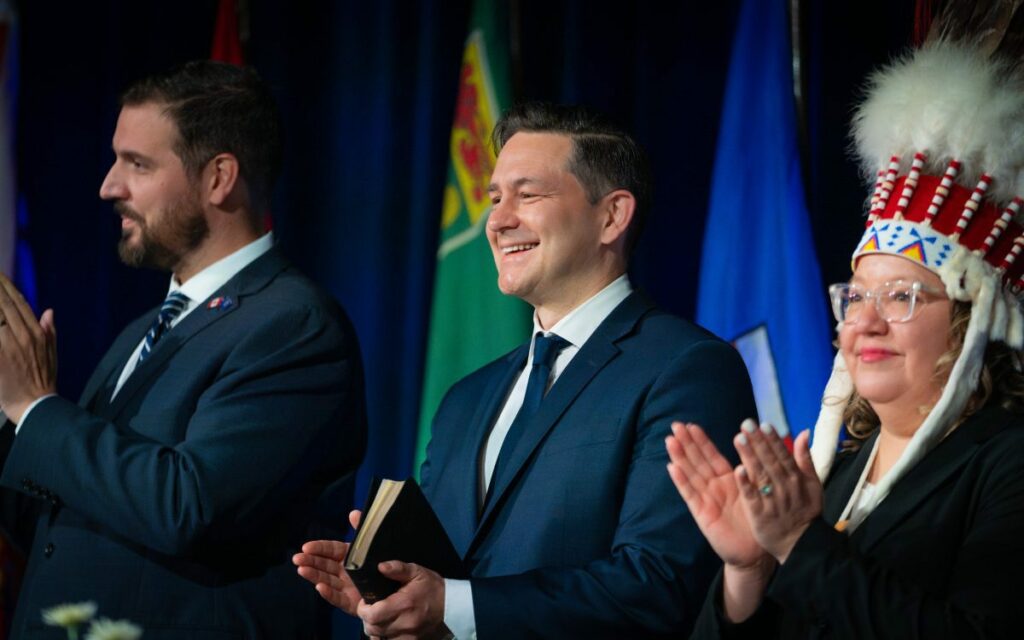
The Conservatives have a commanding lead in the polls and in the donation game, while the Liberals are treading water on both fronts. Pictured: Conservative Leader Pierre Poilievre. Photo Credit: Pierre Poilievre/X.
In the lead-up to the next federal election, Canada’s political landscape is being shaped as much by fundraising efforts as by policy discissions. Axe the Tax, a popular slogan for the Conservatives Party, has translated into millions of dollars in fundraising for the Tories, while Fairness for Every Generations, the name of the recent Budget, has led the Liberals to an empty well. But will a financial edge translate to vicTORY coming election time?
Elections Canada recently released parties’ financial returns for the second quarter of 2024, the Liberal Party saw a notable increase in donations, raising nearly $3.8 million, up from $3.1 million in the first quarter. At the same time, the Conservatives still outpaced all other parties, raising over $9.8 million. The NDP experienced slight decreases in their fundraising efforts raising nearly $1.3 million.
Conservative haves long been known for their fundraising abilities, a reputation that continues to bolster by the current Conservative Leader. With a well-oiled fundraising machine, the Tories have consistently outpaced their rivals in raising funds, allowing them to execute large and targeted ad campaigns with precision.
The party’s financial advantage has empowered efforts to focus on key ridings, particularly in suburban areas where voter sentiments can swing. By deploying resources into digital advertising, data analytics, and grassroots outreach, the Conservatives have been able to tailor their messages to resonate with specific voter segments. This strategic use of funds is not just about winning elections but about establishing a sustained presence that can withstand the ebb and flow of political tides.
This fundraising success allows Conservatives to take risks, experimenting with innovative campaign tactics that might be too costly for their opponents. Whether through high-profile events or aggressive social media campaigns, the party’s financial backing ensures that they remain a formidable force in Canadian politics.
Whereas the Liberal Party faces a more constrained financial situation. While still competitive, their fundraising efforts have not matched the Conservative juggernaut, necessitating a more measured approach to campaign spending.
The Liberals’ strategy has been to focus on quality over quantity, prioritizing high-impact initiatives that can deliver a strong return on investment. This includes carefully selecting ridings where their chances of winning are highest, rather than spreading their resources thinly across the country. Additionally, the party has invested in maintaining a robust ground game, leveraging its volunteer base to compensate for any shortfall in advertising spending.
However, the financial challenges have also forced the Liberals to make tough choices. Unlike the Conservatives, who can afford to be expansive, the Liberals must be careful in their spending, ensuring that every dollar spent is geared towards maximizing electoral success. This often means scaling back on certain initiatives or delaying the launch of new ad campaigns.
For the NDP and other smaller political parties, the fundraising landscape presents an even more complex challenge. With fewer resources at their disposal, these parties must be creative in their approach, often relying on grassroots donations and volunteer efforts to drive their campaigns.
The NDP, in particular, has positioned itself as the party of the working class, which has resonated with a dedicated but financially limited donor base. Their fundraising efforts are often bolstered by union support and small-dollar donations, which, while significant, do not match the financial clout of the Conservatives or Liberals. This financial reality necessitates a focus on cost-effective campaign strategies, such as social media outreach and community engagement, where the party can punch above its weight.
If the analogy of “people vote with their money” is true, voters have made their minds up about the next election. The Conservatives have a commanding lead in the polls and in the donation game, while the Liberals are treading water on both fronts.
The Conservatives’ financial advantage allows them to dominate the campaign landscape. While the Liberals are forced to take a more cautious approach which reflects the realities of their fundraising capacity. In the end, the ability to effectively raise and deploy funds will play a key role in determining who wins the next election, but like many things in politics it’s not over until the final vote is cast. Until then, there are many things that can change and swing fate another direction.

Daniel Perry is the Director of Federal Affairs at the Council of Canadian Innovators, leading national advocacy and engagement efforts. With experience in consulting and roles at the Senate of Canada, Queen’s Park, and the Canadian Criminal Justice Association, Daniel has helped political leaders and clients across various sectors achieve their public policy goals. A frequent media contributor and seasoned campaigner, Daniel holds a Master of Political Management from Carleton University.






